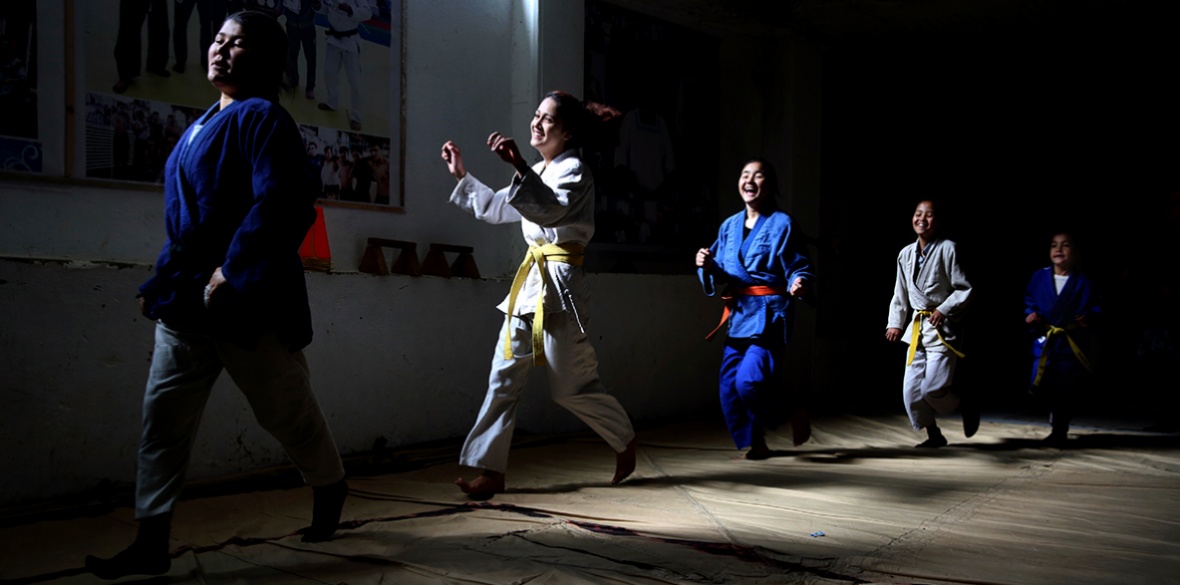This is the last article you can read this month
You can read more article this month
You can read more articles this month
Sorry your limit is up for this month
Reset on:
Please help support the Morning Star by subscribing here
A YEAR and a half ago, Liqa Esazada for the first time stepped into a martial arts club for women in Kabul, something of a rarity in this still deeply conservative Muslim society.
At the time, she had just accompanied her older sister but was immediately intrigued. The 22-year-old is now one of two dozen Afghan women who find inspiration and empowerment in Japanese jujitsu, a martial arts form that dates back centuries.
They love the sport and dare to dream big, hoping someday to compete on the international level.
In war-torn Afghanistan, where gender discrimination has deep cultural and historical roots and where many women suffer from domestic violence, jujitsu seems an ideal sport for women. It teaches self-defence against a stronger and heavier opponent by using certain holds and principles of leverage.
Esazada said she wants to show a more positive side of Afghanistan — and “become famous and win the world jujitsu championship medal.”
Sayed Jawad Hussiani, a jujitsu instructor at the Nero club where Esazada trains, said this martial arts form with roots in feudal Japan was first brought to Afghanistan in 2005 but has since become popular among boys and girls alike.
The women in Hussiani’s group find strength in their team spirit. They braid each other’s hair before training sessions, spar against one another, take turns on the even bars. In winter, they practice their wrestle holds on snow-covered hilltops above Kabul.
Today, about two-thirds of Afghanistan’s population is 25 or younger and Esazada said she has no memory of the Taliban regime, which hosted al-Qaida leader Osama bin Laden and ruled Afghanistan before the 2001 US invasion.
But since the United States and the Taliban signed a deal earlier this year on ending the US’s longest war — an accord that also envisages peace talks between the Taliban and the Kabul government — women in Afghanistan have become increasingly worried about losing some of the rights and freedoms they have gained over the past two decades.
Under the Taliban, women were not allowed to go to school, work outside the home or leave their house without a male escort. And though they still face many challenges, Afghan women are increasingly stepping into their own power in this male-dominated society, finding a voice even in sports.
Esazada said she is not afraid of the Taliban, and if it comes back, she would simply “continue my training to reach my dreams.”
She looks to Afghan women athletes who have made their mark on the world stage. Female athletes from Afghanistan have won more than 100 medals at regional and international tournaments.
Tahmina Kohistani, Afghanistan’s first female Olympic athlete, competed in the 100m run at the 2012 London Olympics. In 2010, the Afghan women’s football team defeated Pakistan 4-0 at the South Asian Football Championship. In 2011, Afghan female power lifters won three gold and two bronze medals at pan-Asian games held in Kazakhstan.
Esazada’s fellow jujitsu student at the Nero club, Rana Rasuli, 21, said she worries about her future if the Taliban manages to retake all of Afghanistan.
For now, Rasuli said she is happiest when she can come out of her home and exercise with the other girls at the club.












